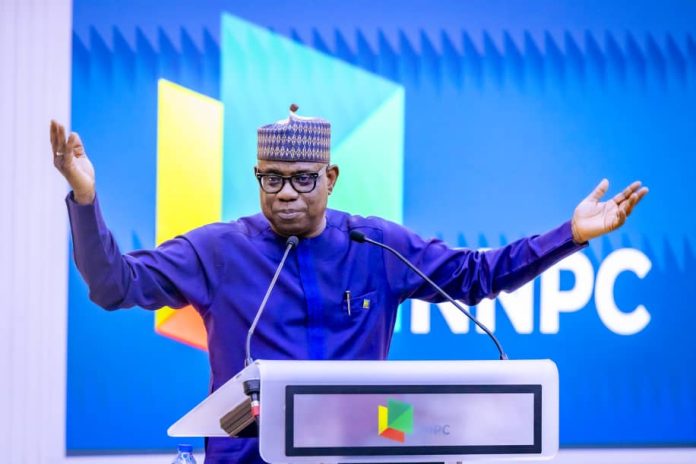By NIyi JACOBS
The Nigerian National Petroleum Company (NNPC) Limited has raised the pump price of Premium Motor Spirit (PMS), commonly known as petrol, to N915 per litre in Lagos and N945 per litre in Abuja, deepening concerns over cost-of-living pressures and further complicating the country’s inflation outlook.
This marks a N45 per litre increase in Lagos, from a previous N870, and a N35 hike in Abuja, from the earlier N910 per litre.
BusinessNG confirmed the price adjustment on Monday following field visits to NNPC retail stations. At NNPC’s outlet on Fin Niger axis of the Badagry Expressway, Lagos, attendants had updated the pumps to reflect the new N915 pricing. Similarly, the station at Igando matched the new price, bringing the citywide average to that threshold.
In Abuja, the change was more pronounced. At the NNPC station in the Federal Housing area of Kubwa, the price jumped to N945 per litre—one of the steepest increases seen since the partial subsidy removal of May 2023.
Independent Marketers Raise Prices
The upward trend wasn’t limited to NNPC outlets. Private and major marketers also adjusted their pump prices across major Nigerian cities.
MRS Oil Nigeria Plc, a strategic partner of Dangote Refinery, raised its pump price to N925 per litre in Lagos, up from N875. Similarly, TotalEnergies hiked its price to N910, and Oluwafemi Arowolo Petroleum, located in Iba, sold petrol at N920 per litre.
These increases follow Dangote Refinery’s decision on June 21 to raise its ex-depot price of petrol from N820 to N880 per litre, signaling a new wave of retail price hikes.
Dangote’s Distribution Drive Raises Concerns
The ripple effect in retail pricing trails closely behind the refinery’s announcement of a large-scale logistics expansion. On June 15, Dangote Refinery disclosed that it had acquired 4,000 compressed natural gas (CNG)-powered tankers and was set to begin nationwide distribution of petrol and diesel by August 15.
While the move is expected to cut middlemen costs and enhance fuel availability nationwide, it has triggered anxiety in the downstream petroleum sector.
The Petroleum Products Retail Outlets Owners Association of Nigeria (PETROAN) warned that Dangote’s deepening control over production and distribution could lead to a monopolistic structure. In a recent statement, the association said the move may “disguise forward integration as efficiency,” potentially sidelining small and mid-sized retailers and resulting in job losses across the distribution chain.
Similarly, the Major Energies Marketers Association of Nigeria (MEMAN) has called for clarity and transparency in Dangote’s logistics proposal, noting that national fuel distribution is a highly sensitive operation that must involve multiple actors to maintain stability and fairness.
Analysts See a Mixed Bag
Analysts told BusinessNG that while Dangote’s end-to-end distribution model could reduce bottlenecks and benefit consumers over time, the immediate price surge at pumps across the country suggests the system is still adjusting.
“This kind of pricing wave reflects a restructuring of cost layers—freight, distribution margins, ex-depot changes—and taxes, all compressed into the pump price,” said David Oje, an independent energy economist. “The risks lie in the absence of regulatory clarity and market buffers.”
Another analyst noted that with the exchange rate hovering around N1,500 to the dollar, imported components of local refining—such as catalysts, spares, and crude feedstock—may continue to exert cost pressures, especially for refiners like Dangote who blend both local and imported crude.
Mounting Inflation, Declining Confidence
The petrol price hike will almost certainly stoke inflation, which has only recently shown signs of moderating. With transport costs, food distribution, and household energy tightly linked to fuel pricing, many households will experience further erosion of disposable income.
Urban transportation services such as danfos, ride-hailing apps, and intercity buses are expected to raise fares in the coming days, which may force more Nigerians to cut back on mobility or shift to cheaper alternatives like motorcycles and bicycles.
In response, labour unions are expected to resume agitation over the rising cost of living and lack of social safety nets—especially in the absence of a functioning fuel subsidy system or targeted relief programme.
No Word from NNPC or Regulators
As of press time, the NNPC and downstream regulators had not released any public statements on the hike or how long the current pricing band will last. Industry watchers note that without a transparent pricing template or fuel price modulation framework, consumers and marketers alike remain in the dark on future trends.
Some stakeholders are calling on the Nigerian Midstream and Downstream Petroleum Regulatory Authority (NMDPRA) to step in and provide a pricing guideline or monitoring structure to ensure that petroleum marketers don’t arbitrarily inflate prices or exploit temporary supply shocks.
Conclusion
The latest fuel price surge underscores the fragility of Nigeria’s deregulated petrol market and the urgent need for clear policies, competitive fairness, and targeted relief to protect consumers, especially in low-income groups. While Dangote Refinery’s distribution plans promise longer-term supply chain efficiencies, the immediate impact is a steep price burden on Nigerians already struggling under economic pressures.














